The planning for this conference began at about the same time as I arrived and has been taking up a steadily increasing amount of our time ever since. As the various chores were divvied out, I was thrilled to learn that I would be responsible for coordinating lodging for all of the folks who were unable to find lodging of their own.
The headquarters compound where the conference would be held (and, incidentally, where I live, work, and eat) was built to accommodate 800 personnel. There are currently over 2,300 people stationed there. In the midst of all of this, they've been tearing down some of the housing buildings (don't ask why) and making even less space. Needless to say, the conference guests would have to stay elsewhere.
"Elsewhere" turned out to be Camp Souter, a British base on the other side of town. They too are pretty well crowded, so "accommodations" mostly turned out to be a collection of tents they had sitting empty in the base. Good enough I suppose.
For my part, I was to be at Camp Souter to show folks around once they arrived and arrange transportation to get them from Souter to the HQ compound on the days of the conference. To ensure I was there before any of our new friends arrived, I got dropped off two days before the conference was scheduled to begin.
The Canadian detachment on Camp Souter put me up in one of their few spare rooms and set me up to use their clubhouse as a reception area as folks arrived:
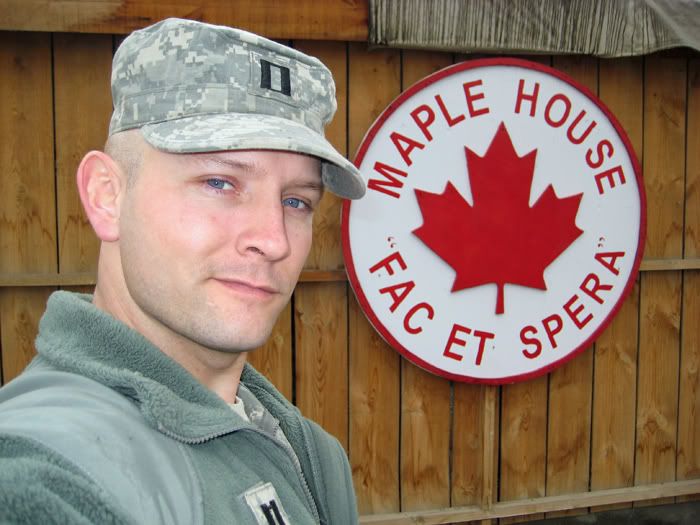
I really wish I'd've thought to take some pictures of the inside of this place. They've got a pretty good setup in there. There's a pool table and a decent sound system with a Wii and a couple of TVs and such. There's also a foosball table, hockey game, darts, a bar, two big grills, and more. Even though I woke up frightfully early and stayed up ridiculously late waiting for people to arrive, I couldn't exactly call it a hardship during my two days there.
Especially since only four people showed up at all in my first day there.
On the second day another sixty or so arrived. Mixed in was a sizeable group that had a meeting at HQ that afternoon. To facilitate this, we’d scheduled an armored bus to come and pick them up. I was expecting the bus at 1400 and told them all where to meet up when the time came around.
The time ended up coming around at 1230 when an Army 2nd Lieutenant in full combat gear walked up, saluted, pointed out the armored bus with four armed and armored gun trucks, and told me they were ready to go but my passengers hadn’t shown up. So I said, “Well, you’re awfully early, so if you guys want, you might as well stand down and grab lunch or whatever. It’ll be a while yet before everyone comes back.”
“Early?” says he, as he pulls a paper out of his pocket and shows it to me. “The order we got from you guys said to be here for a pickup at 1230.”
Oh dear.
I gave him my cellphone number and started rounding up the folks that needed to be on the bus. Since they were all off running around and thinking they had another 90 minutes to do whatever, it took a bit of time. About fifteen minutes into this little quest, my phone rang. It was an angry caller, but in hindsight it was a fun call:
ME: Hello.
CALLER: Is this Lieutenant Thorsson?
ME: Yes it is.
CALLER: This is Captain [garbled], the S-3 over here at Phoenix. I just got off the phone with my convoy commander and he said you didn’t have your people ready to move. I want you to tell me just what the hell is the problem over there.
ME: Okay, Captain, let’s slow down a minute. I realize you’re in the Army and when you’re talking to a lieutenant your used to talking down to someone. But I’m in the Navy, so you can stop acting like you outrank me.*
CALLER: Oh, well you…
ME: Now I was told your guys would be here at 1400. I’m not sure where the wires got crossed, but I’ll take the blame for that and I apologize. For right now I’m trying to track down a busload of lieutenant colonels** to solve our problem and the longer I talk to you, the longer it’s going to take. Is there something else you needed?
CALLER: No, that’s all really.
ME: 'Kay, thanks, buh bye.
This would prove to be the first in a series of Army officers who found me convenient for being unpleasant to. The next was a US Army lieutenant colonel who decided it was my fault that every accomodation facility in Kabul is overcrowded, forcing him to spend the conference sleeping in a tent. I suppose in his mind it was my idea to move tens of thousands of additional troops into the country. I don't really see what the big deal was though.
After all, the tents were heated. Or at least they started that way.
By 1900 two of the five heaters had broken down and refused to restart. These were amazing marvels of Rube Goldberg mechanics that ran on both diesel and electricity. By "ran on both" I mean to say that if there was a shortage of either they would shut down. The startup procedure was simple enough, but after half an hour of troubleshooting I was done raging against the machine.
By 2200 I'd given up on seeing any more people showing up and started moving lieutenant colonels and majors out of the tents and into rooms in real buildings that were set aside for colonels. I saved four empty beds for just in case. For no reason I can think of, three Germans and one Norwegian chose to stay in one of the unheated tents. Six US Army guys and one naval officer chose to stay in another unheated tent. Temperatures were predicted to drop well below freezing and there were at least eighteen empty bunks in the heated tents, but I decided not to push the issue after letting them know about it. Military people are wierd.
By 0130 I was in bed.
On my third day there the conference actually began. For me it began peacefully enough over at Camp Souter when I woke up at 0500:
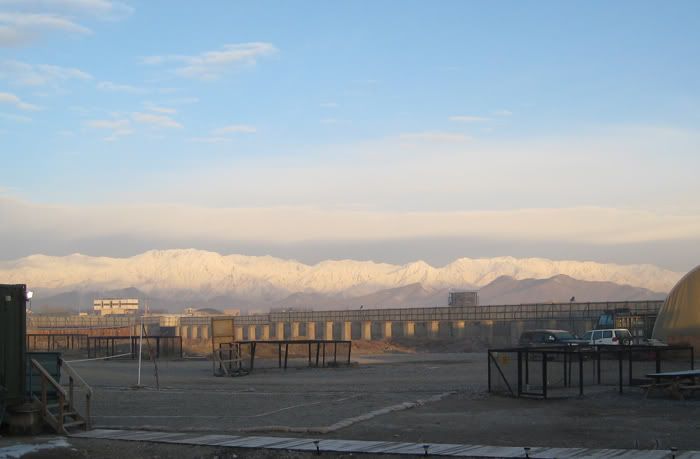
Once I’d made sure all of the folks camped out with me were loaded onto the buses, I loaded me on the last one. Upon arrival at the HQ compound I took up my post at the front desk of the gym with Major Spilios Tsiros of the Greek Army and Major Adam Wloczewski of the Polish Army. We had a pretty good time with it most of the time:
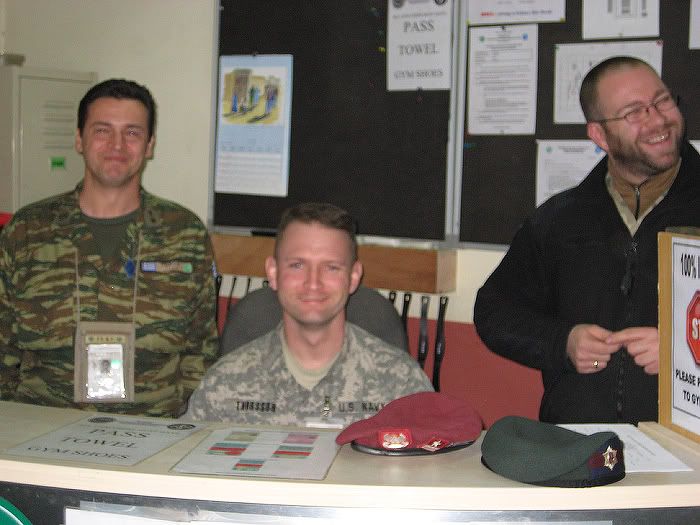
Others from our outfit were not so lucky, such as Major Cheff (Canadian Army):

My duties there were simple. I was to answer questions for all of the guests who were new to the compound.
“Yes, ma’am, the restroom is down that hall to the left.”
“Yes, sir, there will be more coffee laid out soon.”
“No, sir, we can’t add you to the list of speakers at this point. The agenda has been set for over two weeks now."
Meanwhile, everyone else was inside working to shape the future of a nation:
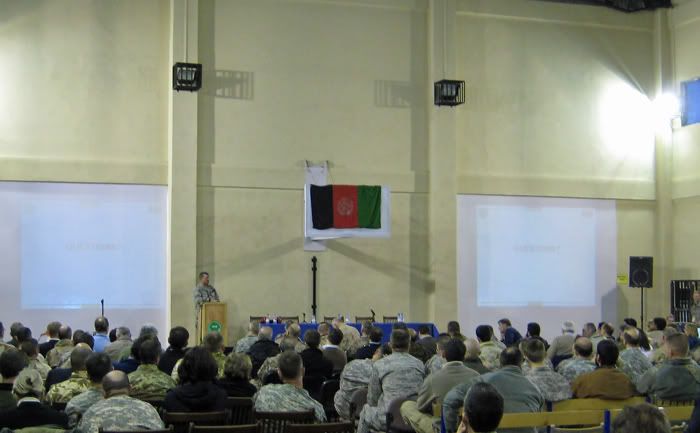
I was pretty happy with my little contribution to the conference and things were going pretty smoothly. Then, in the midst of this brief moment of well-being, a very irate full colonel*** from the US Army managed to stump me with the first difficult question of the day:
“Why is Deputy Minister So-and-so up on the stage with the rest of the panel?”
“I can’t tell you sir,” says I, “I’m just here to help folks find their way around, the panel members were invited by the Admiral**** there.”
Ignoring my confession of uselessness, he went on. He explained that he was assigned as mentor to this particular Afghan official and that as far as he was told, his charge was invited to observe and would not have a speaking part. He was also expecting to have an interpreter assigned to him as he does not speak English. Now there he was, seated on the stage with a number of other government officials, without an interpreter, and staring into the working end of a microphone. As the panel droned on about their various visions for the future of the nation, this colonel continued to rant about how screwed up our entire organization was.
A good twenty minutes into his blustery review of everything wrong with NATO in general and ISAF in particular (which were now apparently the fault on one lowly US Navy lieutenant), one of my co-workers walked up and asked if I knew anything about the extra guy on the panel. It turns out that he sat down in the front row along with the rest of the Afghan government officials attending the conference, and when the Admiral invited the panel to join him on the platform this extra dude just went along with the crowd. Being attentive, the Admiral noticed that there was someone there who he knew nothing about and he sent my officemate Vic to find out whatever he could about him.
So when Vic asked me if I could find any bio information on the extra minister, I pointed him toward the very heated Army Colonel standing inches away from me and let him get yelled at for a few minutes. After ten minutes of noise about how embarrassing it will be for this poor guy if he's called on to speak and forced to flounder in front of his peers, I decided to interrupt:
"Sir," says I, "If you could hold off being angry about this potential problem for just a moment, Lieutenant Commander Vale here is looking for some information to pass to the Admiral so we can prevent the problem you're worried about. All we need is a few notes on who he is and we'll make sure he gets the word not to ask him to speak."
"Oh," says he, "Well, uh, his name is [Such-and-such], he's the Deputy Minister of [whatever]. Um, he's [XX] years old. He's Pashtun. What else do you need? I don't know."
Vic scribbled all of this down and wrote in bold letters across the top "DO NOT ASK THIS MAN TO SPEAK!" I stood there looking attentive as the Colonel continued to berate me for causing this whole problem. While I waited, looking duly apologetic and saying "yessir" a lot, I watched Vic hand the note to the Admiral and point out the line at the top. Once the Admiral nodded, I excused myself to the Colonel and made myself look busy with some other tidbit of minutia until he went away.
Ten minutes later he found me again.
"So," he spouts, "guess who's at the fucking podium right now!"
I'm still not sure what else I could've done for him. Here in this headquarters we've got a few dozen Generals and Admirals, a few hundred Colonels, Captains, Lieutenant Colonels, and Commanders. If he was really looking to find someone to make a change to the way things are run here, he probably should've looked for someone other than the Navy Lieutenant who was designated to show the guests where the bathrooms were.
I later learned that it was one of the other Afghan ministers who invited this guy up onto the platform and it was this deputy minister himself who ask for an opportunity to speak. So much for his US Army Colonel mentor being on top of things.
After that little bit of angry, the rest of the conference passed without any major headaches. I continued to sort out a handfull of concierge-related things and helped out with making sure that nothing got lost. I'm sure there was a great deal of valuable information traded in the course of the event, but I missed it.
The one portion of one panel that I did sit in on was, in my mind, a microcosm of everything wrong with policy-making in this country. There was an Army Colonel leading a panel discussion on prison reform within Afghanistan. They'd gone over a few things at the outset before opening the discussion to questions from the floor. The first one was precious:
"Colonel," asked the asker, "Are there any plans for the prisons to begin collecting biometric data such as digital fingerprints or retina scans to keep track of the prisoners."
This is precisely the sort of thinking that causes problems with reconstruction efforts here. Biometric data collection in the rest of the world is a great idea. Building scan-able, share-able databases so that law enforcement entities can better identify known criminals is a worthwhile endeavor. But, as the Colonel leading the discussion pointed out, they have more pressing priorities first. For example, many of the prisons in this country don't have electricity. Or sewage systems. Or running water. Or roofs. In fact, I've read reports that a few of them are just big, open pits dug into the ground.
It's pretty hard to manage a biometric database when you don't even have electricity and over half of your staff is illiterate. Needless to say, the Afghan prison system has a ways to go before it catches up with the rest of the world. But I digress.
All in all, it was nice to actually be busy for a few days, but I'm really glad to have this ordeal behind me. Just to celebrate, when it was all over I had myself a tiny little tower of soft-serve ice cream:
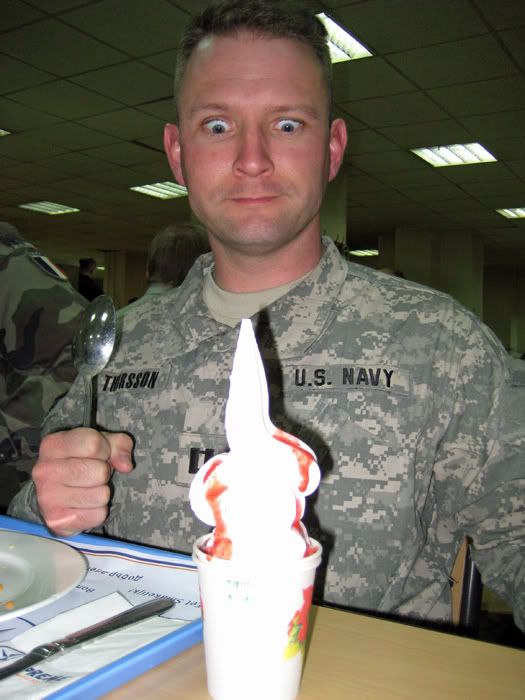
Fortunately, the next one of these things won't happen until well after I'm scheduled to depart. The quarterly PRT conference was a success, but it was also such a pain in the ass that the Admiral has decided to make it a semi-annual event from now on.
Awesome.
*An Army captain is the same paygrade as a Navy Lieutenant, so at best this guy was the same rank as me. More likely, I have greater seniority.**An Army lieutenant colonel outranks a Navy lieutenant (or an Army Captain) by two paygrades. A busload of them who are all interrupted halfway through lunch and told to hurry into their armor and helmets and grab their rifles because someone made a typo are likely to be a bit difficult to keep calm.
***A full Colonel in the Army is equivalent in rank to a Navy Captain or an Air Force Deputy Super-Senior Vice Birdman Commandant. I am not allowed to ignore their problems.
****My boss is a US Navy Commander. His Boss is a Spanish Army one-star General. His boss is a Dutch Navy two-star Admiral. A two-star Admiral can pretty much ignore the hell out of the problems of an Army Colonel. The Air Force calls their flag-level officers "General" as well, but they make them wear hats with lightning bolts on them***** so it's still pretty goofy.
*****I'm totally not kidding about the lightning bolts:

But I should stop making fun of the Air Force. They get enough of that already, those poor goofy-looking bastards...

No comments:
Post a Comment